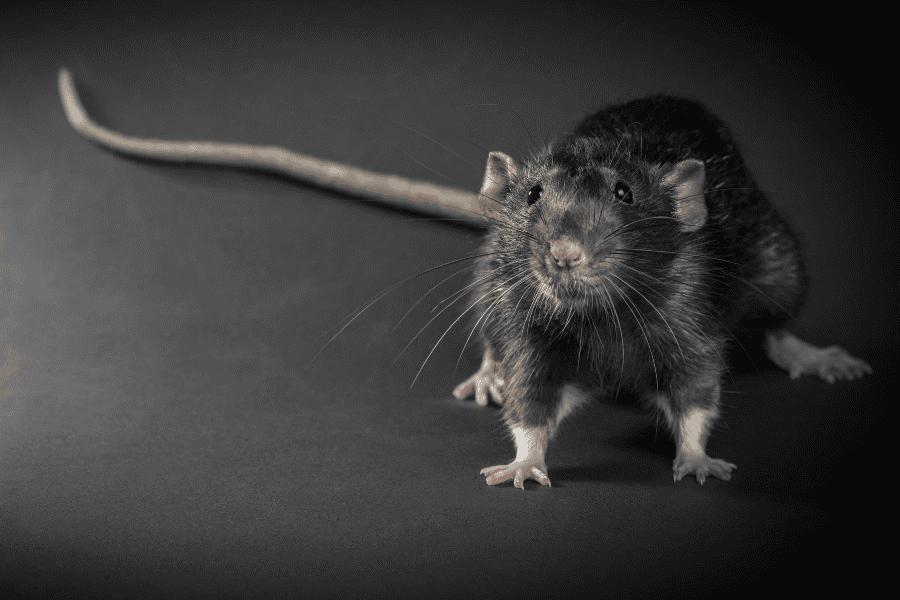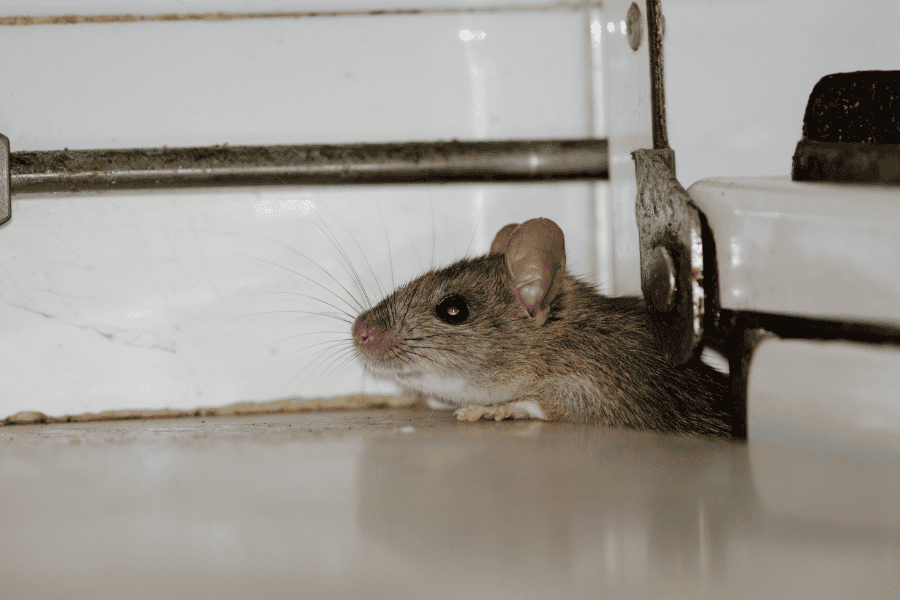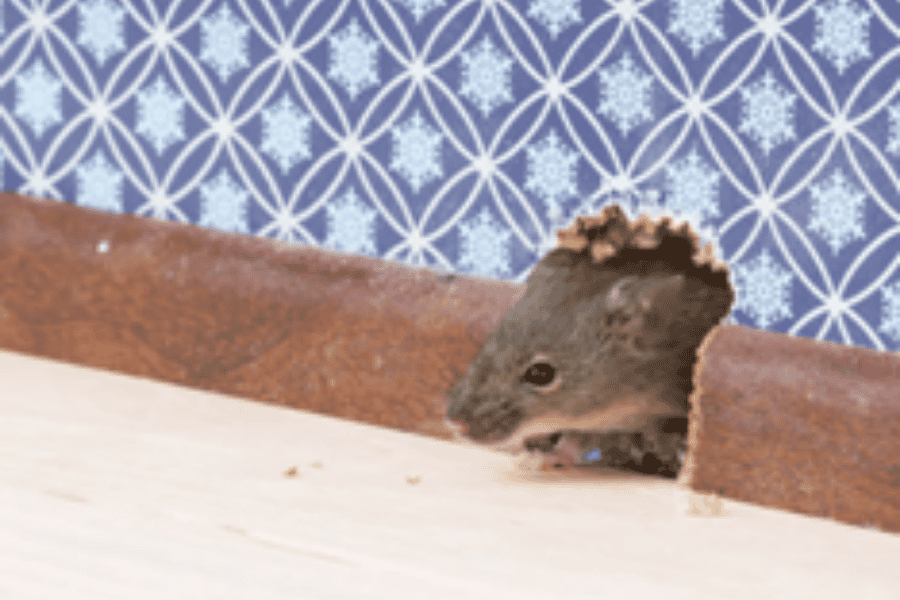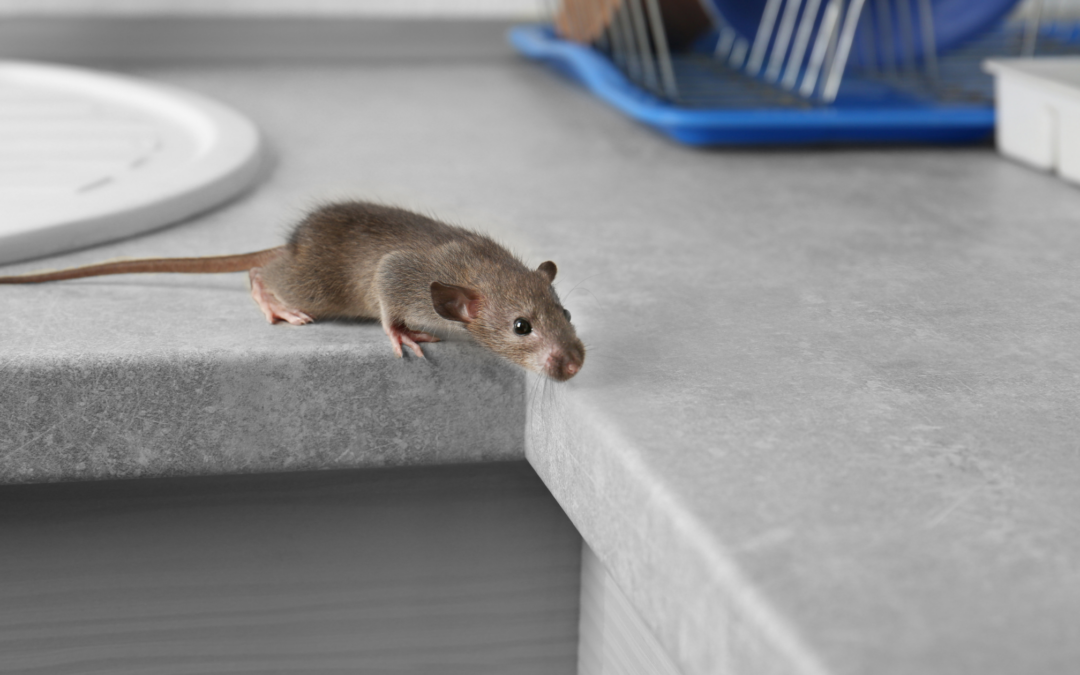READY TO GET STARTED?
REQUEST A FREE ESTIMATE
Fill out the form below or call (888) 466-7849 for a free, no-obligation estimate.

Roof rats, also known as black rats, are a common nuisance in Georgia homes and businesses. These rodents are notorious for invading attics, rooftops, and upper levels of buildings, causing damage and spreading diseases. Identifying a roof rat infestation early is crucial for preventing a growing rat population in your home. In this blog, we’ll discuss how to identify roof rats, where they are commonly found, why they are hazardous, and how to get rid of them. Plus, we’ll provide essential tips on rodent prevention.
Roof rats (Rattus rattus) are smaller and more agile than their relative, the Norway rat. Here are some key features to help you identify them:
Roof rats prefer to nest in high places, making them more likely to infest attics, rafters, and upper levels of homes and buildings. They are excellent climbers and often use tree branches, power lines, and vines to access rooftops. Some common nesting sites include:
Because roof rats are attracted to food sources, they often seek out accessible pet food, bird seed, fruits, and unsecured garbage bins.
Yes, roof rats pose several hazards to humans, pets, and property. Here’s why they should not be ignored:
Eliminating a roof rat infestation requires a combination of trapping, exclusion, and professional rat control services. Here are effective methods:
If the infestation persists, hiring a pest control company is the best solution. Professionals can assess the situation, set up strategic traps, and provide long-term rodent control solutions to keep roof rats out. If you are looking for eco-friendly options, green pest control is an alternative to traditional pest control methods that provide the same effectiveness with environmentally friendly solutions.
Preventing roof rats from invading your home is much easier than eliminating them after an infestation. Here are some tips to keep them away:
If you suspect a roof rat infestation in your Georgia home, it’s important to act fast. These rodents multiply quickly and can cause extensive damage. A professional pest control company can provide expert rodent control services, safely remove the infestation, and implement preventative measures to protect your home.
Don’t wait until the problem worsens—contact a pest control expert today to keep your home rat-free!

Rodents such as rats and mice are among the most common household pests in Georgia. They are notorious for invading homes, contaminating food, spreading diseases, and causing structural damage. Learning to identify the signs of rodents and taking proactive steps to prevent infestations can help protect your home and family. Below, we outline 12 practical rodent control tips, discuss the types of rodents common in Georgia, and explain why these pests invade homes.
Rodents enter homes searching for three basic needs: food, water, and shelter. Here’s why and how they manage to get inside:
Inspect your home for cracks, holes, and gaps, especially around doors, windows, and the foundation. Use steel wool, caulk, or hardware cloth to seal these openings, as rodents can gnaw through weaker materials.
Store all food, including pet food, in airtight containers. Clean up crumbs and spills promptly, and avoid leaving dirty dishes overnight.
Repair leaky faucets and pipes, and ensure your home’s drainage system works efficiently. Remove standing water both inside and outside your home.
Rodents love cluttered spaces where they can hide and nest. Keep storage areas tidy, dispose of unused items, and organize your garage or attic.
Vacuum floors, wipe down counters, and take out the trash daily. Rodents are less likely to settle in a home that’s free of food residue.
Gaps under doors are a common entry point for rodents. Installing door sweeps can prevent rats and mice from sneaking inside.
Traps are an effective do-it-yourself rodent control method for small infestations. Snap traps, glue traps, and live traps are widely available at hardware stores. Be sure to place traps near walls and areas with visible signs of rodents, such as gnaw marks or droppings.
Natural deterrents like peppermint oil, cayenne pepper, and ultrasonic devices can help repel rodents. However, these methods are often best used alongside more robust solutions.
Trim tree branches that touch your roof, as they serve as highways for roof rats. Remove piles of debris, and store firewood at least 20 feet from your home to eliminate potential nesting sites.
Stay vigilant for signs of rodents, including droppings, chewed wires, nests made of shredded materials, and unusual noises in walls or ceilings. Early detection is key to preventing a full-blown rodent infestation.
If you’re using traps or rodenticides, ensure they’re placed in areas inaccessible to children and pets. Many rodent control products can be hazardous if accidentally ingested.
For severe rodent problems, contacting a professional rodent exterminator or pest control company is the safest and most effective solution. These experts have the tools, experience, and knowledge to eliminate rodents and prevent future infestations. Consider pest control companies who specialize in green pest control methods to not only eliminate your pest issues but do so in a way that is safe for the environment, children, and pets.
Rodents are not just a nuisance; they pose serious health risks. They can spread diseases to humans and pets, including:
These diseases underscore the importance of addressing rodent problems promptly.
If you suspect an infestation, take the following steps immediately:
While do-it-yourself rodent control can be effective for minor infestations, professional pest control services offer significant advantages:
If you’re searching for “rodent control near me” in Georgia, consider reaching out to a trusted pest control company for a consultation.
Preventing a rodent infestation is always easier than eliminating one. Follow these tips, stay vigilant, and take action at the first sign of activity. Rodents may be small, but their ability to contaminate food, spread diseases, and damage property makes them a big threat.
Whether you need assistance with rat control, advice on how to get rid of rodents, or help with ongoing rodent problems, don’t hesitate to contact a professional pest control company. They can provide the expertise and peace of mind you deserve.
If you’re dealing with a rodent issue or want to take preventive measures, call a local pest control company today for a free consultation. Let the professionals handle the problem so you can enjoy a safe, rodent-free home.

Rodents can cause serious damage to both your home and your health. If you live in Broward County, Florida, and want to protect your home from these pests, this guide will help you understand how to deal with rodent infestations effectively while keeping your living space safe.
This post will cover the types of rodents common in the area, why they’re such a problem, and the most effective ways to handle infestations. By the end, you’ll be equipped with practical solutions for dealing with rodents in your home.
Florida’s warm, year-round climate is an ideal environment for rodents like rats and mice, which thrive in urban areas and can cause significant structural damage. Common rodents in Broward include Norway and roof rats, both of which are known to spread diseases and damage insulation, wiring, and wood.
While managing a rodent infestation can be challenging, there are a number of effective ways to deal with it, from preventive measures to active control strategies.
The first step in controlling rodents is preventing them from entering your home in the first place. Inspect your home for gaps around doors, windows, and utility lines. Use durable materials like steel wool, copper mesh, or caulking to seal off potential entry points. Regularly check attics and crawl spaces for signs of rodent activity.
Traps and bait are some of the most common methods for controlling rodent populations. While traditional snap traps are effective, there are also more humane options available. Live traps, for instance, allow you to capture and release rodents away from your property. For bait, consider using alternatives to toxic chemicals, such as non-poisonous bait stations that are safe for pets and children.
Certain smells are known to deter rodents. Some natural repellents, like peppermint oil, can be used to create a barrier around entry points or areas where you’ve spotted rodent activity. Other deterrents include cayenne pepper and vinegar-water sprays.
Prevention is always better than dealing with an infestation. Here’s how you can minimize the risk of rodents in Broward County:
Dealing with rodent infestations quickly is essential to prevent long-term damage to your home and health. Rodents are not only a nuisance, but they can also spread diseases like leptospirosis, hantavirus, and salmonella. Taking steps to secure your home and eliminate food sources for rodents will make your living environment safer for you and your family.
By implementing these practical rodent control strategies, you can maintain a pest-free home and avoid the structural damage and health risks associated with rodent infestations in Broward County. Contact a pest control company near you today to get started.

As temperatures drop in Florida during December, homeowners often find themselves facing an increase in rodent activity. While Florida’s warm climate means pests like rats and mice are a year-round concern, winter months bring a few specific challenges that make Florida rodents more of a problem. Here’s why December is a particularly tricky time for rodent control in the Sunshine State.
Even though Florida doesn’t experience extreme winter weather, the cooler temperatures of December still drive rodents indoors. Rats, mice, and squirrels are all looking for warmth, food, and shelter as their natural outdoor food sources become scarcer and the air chills. Your home, with its heat and accessible food, becomes an attractive target.
A small rodent infestation in December can rapidly turn into a big problem. Mice and rats breed quickly—mice can reproduce as often as every 3 weeks! If you don’t address the issue right away, a handful of rodents can turn into dozens, causing more damage and creating more health risks as the season goes on.
Rodents are notorious for chewing on electrical wires, insulation, and even structural elements of your home. This can result in costly repairs and pose fire hazards. In addition to physical damage, rodents are carriers of diseases like salmonella, leptospirosis, and hantavirus. When they enter your home, they bring these health risks along with them.
As the days get shorter and the nights get longer in December, rodents become more active after dark. They often search for food during nighttime hours when there’s less human activity. If you’ve noticed strange noises or signs of gnawing at night, it could be a sign of an infestation.
The best time to deal with a potential rodent problem is before it gets out of hand. In December, rodent-proofing your home is crucial. Sealing entry points, setting traps, and eliminating food sources are all effective measures to keep rodents out. The earlier you address the problem, the easier and more cost-effective it will be to eliminate.
December presents unique challenges for Florida homeowners when it comes to rodent control. As Florida rodents seek shelter from the cooler weather, they can cause damage, spread diseases, and multiply quickly. By being proactive in rodent prevention, you can ensure your home stays clean and rodent-free throughout the winter months. If you encounter persistent rodent issues, consider contacting a local pest control company for expert assistance and tailored solutions to protect your home.

As winter sets in and temperatures drop, rodents begin looking for warmth, food, and shelter — often finding it inside homes. Many homeowners across Georgia experience an uptick in rodent issues during the colder months. This seasonal shift creates a heightened need for effective rodent control to protect your home from potential infestations. In this guide, we’ll cover why rodents are more likely to invade in winter, the types of rodents that commonly infest homes, and actionable tips to help you prevent future rodent issues.
Rodents, like all animals, seek a stable environment to survive through the colder months. When winter arrives, food and water sources become scarcer outdoors, pushing these creatures to find alternatives. Indoor spaces provide the warmth and shelter they need to survive. They often target areas like attics, basements, garages, and even kitchens where food and nesting materials may be available.
Common entry points for rodents include small cracks, holes, and gaps in walls, roofs, and foundations. Rats and mice can squeeze through surprisingly tiny openings, with mice needing only a quarter-inch gap to gain entry. Once inside, they multiply quickly, which is why a minor rodent issue can turn into a full-blown rodent infestation if not addressed promptly.
In Georgia, the most common types of rodents that invade homes in winter are:
Each type poses unique challenges and can cause extensive damage to a home’s structure, wiring, insulation, and more if left unchecked. Understanding the kinds of rodents prevalent in Georgia can help you recognize their presence sooner and take action.
Before tackling rodent control, it’s important to know the signs of a rodent infestation. Here are the key indicators:
If you notice any of these signs, it’s time to consider immediate rodent control measures. A local pest control company can help you evaluate the severity of the infestation and recommend effective solutions.
The best approach to rodent control in winter is a combination of prevention, exclusion, and routine maintenance. Here’s how you can effectively protect your home:
Since rodents can squeeze through even the smallest gaps, it’s essential to thoroughly inspect and seal any entry points.
Rodents are attracted to food, so keeping your home clean and food sources secured can deter them.
Rodents prefer areas with plenty of hiding spots and nesting materials.
The outside of your home can be just as attractive to rodents as the inside.
DIY methods can help, but they may not always solve the problem. Partnering with a reputable pest control company for rodent control is crucial for long-term prevention. Professionals can inspect your home, identify all potential entry points, and recommend solutions like rodent exclusion to secure vulnerable areas.
Additionally, a pest control professional can help you implement a monitoring system to detect any recurring issues, enabling quick responses to prevent future infestations. Look for a company that specializes in rodent control near me to ensure they understand the local rodent species and effective deterrent methods.
Winter months often mean an increased risk of a rodent infestation, but by being proactive, you can keep your home rodent-free. Sealing entry points, removing food sources, and maintaining a clutter-free environment can go a long way in preventing these pests from invading. However, if you notice signs of rodents in your home, don’t wait to seek professional help.
Working with an experienced pest control company can make all the difference in keeping your home safe, secure, and rodent-free. By taking these steps now, you can help prevent rodents from making your home their winter hideaway.